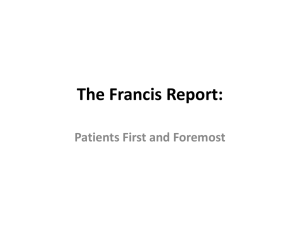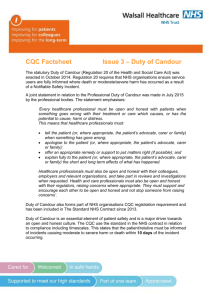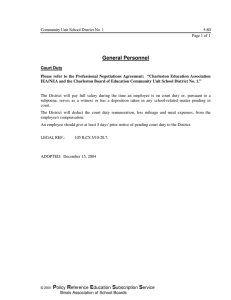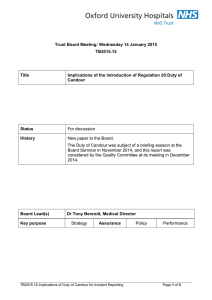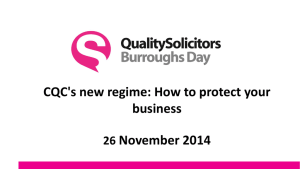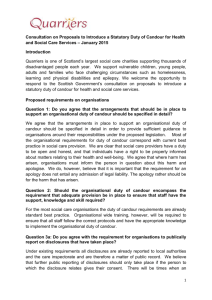UKHCA Consultation Response
advertisement
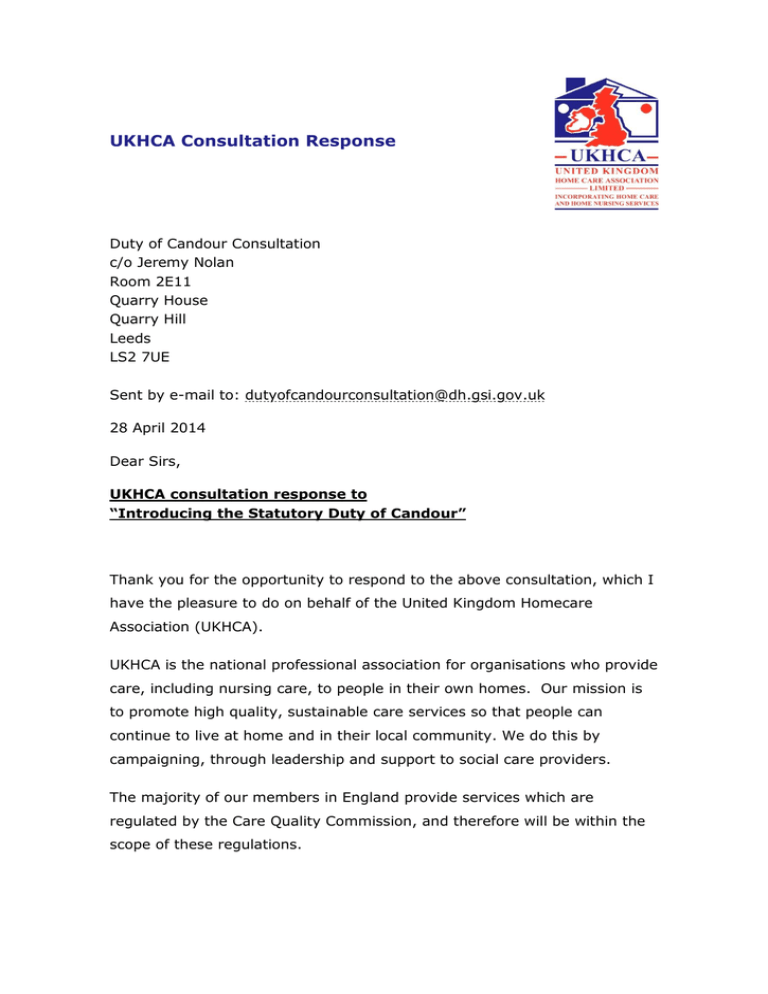
UKHCA Consultation Response Duty of Candour Consultation c/o Jeremy Nolan Room 2E11 Quarry House Quarry Hill Leeds LS2 7UE Sent by e-mail to: dutyofcandourconsultation@dh.gsi.gov.uk 28 April 2014 Dear Sirs, UKHCA consultation response to “Introducing the Statutory Duty of Candour” Thank you for the opportunity to respond to the above consultation, which I have the pleasure to do on behalf of the United Kingdom Homecare Association (UKHCA). UKHCA is the national professional association for organisations who provide care, including nursing care, to people in their own homes. Our mission is to promote high quality, sustainable care services so that people can continue to live at home and in their local community. We do this by campaigning, through leadership and support to social care providers. The majority of our members in England provide services which are regulated by the Care Quality Commission, and therefore will be within the scope of these regulations. The following paper responds to the questions that Government has asked within the consultation exercise. Please do not hesitate to contact me if you require any additional information. Yours sincerely, Dominic Carter Policy Officer, UKHCA Tel: 0208 661 8188 E-mail: Dominic.carter@ukhca.co.uk Alternative formats: If you would prefer to receive this letter in another accessible format, including e-text, ‘clear print’, large print or audio cassette, please contact us on 020 8288 5291 or accessibility@ukhca.co.uk. UKHCA, Duty of Candour Consultation response, April 2014. Page 2 of 8 United Kingdom Homecare Association (UKHCA) Response to Department of Health ‘Duty of Candour’ Consultation Do you have any comments on the Duty of Candour harm threshold chosen for adult social care? We broadly agree with the premise of using the existing CQC notification requirements relating to ‘serious injuries’ as the Duty of Candour harm threshold for adult social care. Members of UKHCA are already familiar with the framework that CQC uses for notifications, and we believe that incorporating this framework into the Duty will help for a smoother and faster implementation of the Duty. By linking the harm threshold to existing CQC frameworks, homecare providers are more likely to proactively adjust to a system they have some familiarity with. Nevertheless, providers of homecare would be reassured and feel more confident to fulfil the requirements of the Duty if further guidance was produced. That guidance should provide greater clarity on what would count as a reportable incident, or ‘serious injury’, and would also help to reduce the number of inappropriate reports, therefore reducing unnecessary added bureaucracy for the regulator. If the threshold is not made clearer, providers might feel compelled to act in a cautionary manner. In turn this may result in CQC having to handle many more reports than it has the capacity to process. A statement of intent that makes clear to providers, regulator staff (including inspectors) and the public, the situations in which a ‘serious injury’ should be reported will also help to reduce differing viewpoints and drawn out arguments. It is vital that this information exists, to allow for consistent decisions to be made when reviewing notifications made. UKHCA, Duty of Candour Consultation response, April 2014. Page 3 of 8 There is also the risk that confusion over the exact definition of the threshold will lead to providers who are already compliant taking additional, and unnecessary, action that will go over and above the requirements of the Duty of Candour to ensure they are compliant. In addition to costs of time and added bureaucracy, this may have an adverse effect on the reputation of the organisation and the confidence of the staff they employ. A clear definition, including examples of uncertain situations, would also assist in cases where a number of agencies are involved in providing care to one individual. With the progression of the integration agenda, we feel that clarity is very important in assisting each party in a multi-agency approach understand their responsibilities, especially if they have only had a limited role to play in the care of that individual. The requirements of the Duty of Candour need to be included in the coordination and communication between different agencies. Do you agree with the requirements to be placed on service providers under the Duty of Candour? Members of our Association who wrote to us have agreed that the requirements to be placed on them as service providers are largely reasonable. As stated in answer to the first question, above, homecare providers registered with the Care Quality Commission are already familiar with the processes expected of them in terms of quality monitoring, complaints and notification of incidents. Outcomes 16 to 20 of the Care Quality Commission ‘Essential Standards of Quality and Safety (March, 2010) detail a variety of actions that a provider must take when certain situations occur. Indeed the Essential Standards outline that CQC expect to be informed about a wider scope of ‘moderate’ incidents than the threshold included within the proposed Duty of Candour. UKHCA, Duty of Candour Consultation response, April 2014. Page 4 of 8 We believe that it would make sense to link quite closely the CQC reporting process expected of homecare providers with the reporting process under the Duty of Candour. Valuable time and resources may be lost if providers are required to submit the same information relevant to an incident through a number of different channels. Instead a more efficient, streamlined process relating to an incident could ensure more focus is placed back on the person using a service. We hope that CQC will consider reviewing the notification reporting process in combined view of the Essential Standards and Duty of Candour. In addition to the CQC notification processes, homecare providers are also familiar with the procedures for bringing incidents to the attention of their local Safeguarding Adults Board (with the local authority as the lead) or the Health and Safety Executive. We hope that further work will be done by the Department of Health in terms of best practice for encouraging information sharing between the SABs, local authorities and CQC. As highlighted in the Think Local Act Personal report, ‘The Duty of Candour – an Adult Social Care Perspective’ (March, 2014), homecare tends to be less episodic in nature than many aspects of the National Health Service. Relationships are therefore often built over a longer period of time, which in itself can promote candour in terms of good practice. Additionally, with a rapidly growing private market for homecare and a fiercely contested public sector market, homecare providers are now more aware than ever that appropriate processes regarding quality need to be in place and followed to win and retain the business that allows them to remain operational. We therefore feel confident that our members, who provide homecare across England, are well placed to respond successfully to the requirements placed on them under the Duty of Candour. There will, however, be challenges for providers to tackle. Training may be required to help homecare provider staff from top to bottom to understand what exactly is expected of them, and the actions they should take if acting under the Duty of Candour. This is likely to be particularly relevant for Registered Managers, a role that will be vital in leading homecare organisations’ approach to the Duty. UKHCA, Duty of Candour Consultation response, April 2014. Page 5 of 8 Furthermore, providers will need to redraft and expand current documentation on policies and procedures to help staff to be fully aware of what is expected of them under the Duty of Candour. New policies will also require a certain level of expertise to ensure every aspect is covered. The Department of Health or CQC may have a key role to play in developing further guidance that will help providers with their approach to training and with drafting new policies. Do you have any views on the costs and benefits associated with the Duty of Candour as set out in the draft impact assessment? Our members believe there will be certain non-monetised benefits associated with a Duty of Candour. Principally it is hoped that the Duty will help to further develop a transparent culture, where people who use services are a key part of the conversation of how lessons are learnt from incidents. In his review, Professor Bruce Keogh KBE (July 2013, p. 6.) stated that there is an ‘imbalance that exists around the use of transparency for the purpose of accountability and blame rather than support and improvement.’ We believe that the requirements placed on service providers under the Duty of Candour provide a platform for that balance to be improved. People who use services and the service providers are potentially given a greater opportunity in the ‘pursuit of improvement’ (July 2013, p.6.). In addition to leading to a better quality of care, the culture of the organisation and the policies, procedures and processes that back that culture up will renew staff confidence from top to bottom that they are being fully supported in their responsibility to the people who use their services. UKHCA, Duty of Candour Consultation response, April 2014. Page 6 of 8 Homecare providers also felt that the Duty of Candour may help the general public to view the sector in a more positive light. Although incidents are likely to gain greater attention, the legal requirements of the Duty to then react and improve may reassure their local community that lessons will be learnt and even better care will ensue. Providers were aware how highly service users value openness and an apology when things go wrong, and believe that culture, cemented further by the Duty of Candour, could strengthen the relationship between providers and the general public. Our members told us they felt requirements enshrined in the Duty of Candour could be important in avoiding escalation of a situation. Prompt apologies, explanations and plans for further action may reduce the likelihood of expensive and stressful (for all parties) legal redress. There are likely to be a series of costs associated with a Duty of Candour, both monetised and non-monetised, that will affect homecare providers. Members of UKHCA highlighted that there is an inherent added risk to the reputation of an organisation that admits to their role in an incident involving a service user. Members were keen to impress, however, that this cost was part and parcel of the business environment in which they operate, and that the safety and wellbeing of their service users was of paramount importance. There will be monetised business costs too. These will vary from one homecare provider to another, depending on the systems and processes that are already in place. For many organisations changes will need to be implemented to develop the necessary avenues of support that will allow staff to be candid. This may be in the shape of developed policies and procedures, staff training (especially for Registered Managers), and the production of materials to ensure both staff and service users are fully informed of changes that are occurring. These costs are unlikely to be a one off, as continued support will be required. Furthermore it is possible that if the Duty of Candour creates a great deal more work for CQC, the additional costs they experience may be passed on to providers through fee rises. UKHCA, Duty of Candour Consultation response, April 2014. Page 7 of 8 We are concerned that the Department has underestimated the costs of the Duty of Candour and the potential increases that may result in the costs of insurance cover. Providers will need to understand how they can comply with the Duty of Candour, while not admitting legal liability and incurring increased premiums from their insurer. It is our belief that the most likely reason for providers failing to comply with the Duty will be fear of jeopardising their insurance cover. In addition, where providers either fail to comply with the Duty of Candour, or admit liability inappropriately, it is possible that insurance cover for social care providers may increase at a faster rate than would otherwise have happened. We strongly urge the Department to consider (1) producing suitable guidance for providers to accompany the Regulations and (2) to seek the assistance of the Association of British Insurers in producing such guidance. Do you think any of the proposals set out in this consultation document could have equality impacts for affected persons who share a protected characteristic, as described above? No, we believe the proposals set out in this consultation document, providing they are appropriately followed, would be fair to all provider staff and people who use homecare services. United Kingdom Homecare Association Ltd (UKHCA) Sutton Business Centre Restmor Way Wallington SM6 7AH Telephone: 020 8661 8188 E-mail: policy@ukhca.co.uk Website: www.ukhca.co.uk Twitter: @ukhca Registered in England. No 3083104 UKHCA, Duty of Candour Consultation response, April 2014. Page 8 of 8
